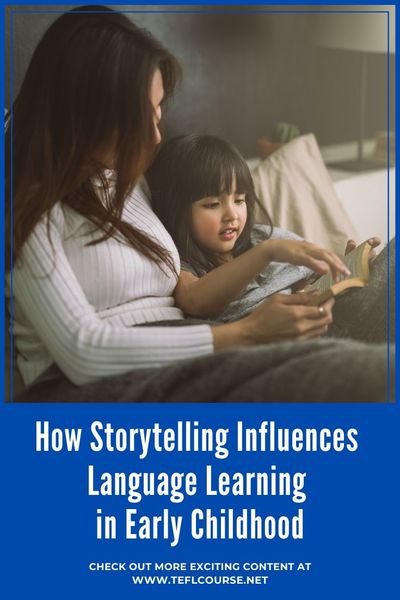How Storytelling Influences Language Learning in Early Childhood

Children are not born with a set vocabulary, yet it is something that they can acquire and build within themselves. Montessori stated, "The baby absorbs speech it hears spoken around it and with it says a word it says it because it has learned it by hearing it, and holds it present in the memory. It uses it according to its need of the moment". Young children behave similarly. When children absorb language, they become better equipped to articulate thoughts and experiences. Children can express themselves more clearly. Precise language can render children independent in their ability to express their needs and emotions. In the early years of a child's development, the child must be exposed to rich language, this is a vocabulary that is precise and descriptive. This exposure will prepare the child for later work in writing and reading English.
Table of Contents
Speaking Activities for the Development Process
Do you want to teach English abroad? Take a TEFL course!
As one of the Indian proverbs states: "Tell me a fact and I'll learn. Tell me the truth and I'll believe. But tell me a story and it will live in my heart forever." (White, 1993: 305-306) that mentions the essential role of storytelling and its impact on learning as it helps in building memory skills and contextualization of the new language.
This post was written by our TEFL certification graduate Najaf Z. Please note that this blog post might not necessarily represent the beliefs or opinions of ITTT.
The Essence of Storytelling
One of the most creative tools in education is storytelling. But It is important to tell the right story at the right time. You do not have to be a great storyteller. Children will happily listen to you tell about your journey to work that day. They will happily laugh with you as you recall your attempts to make an apple pie just like your mother's. It does not have to be a fantastic adventure story. Not just children but young adults too will revel in this. They just love the closeness that is created between the teller and listener.
A good story can attract and hold our attention as it teaches us important life lessons. Children have an innate love of stories. Storytelling is used in the Montessori environment as a small group activity. The children are invited to gather and listen to a story first told by the adult and then the children are invited to tell the same story or stories of their own. In general, these stories are true stories. Sometimes the stories can tend toward fiction, but that is not where the adult starts. Storytelling could help the children think of similar experiences that they can talk about, and maybe someday write about. Stories create magic and a sense of wonder at the world. Stories teach us about life, about ourselves and others. Storytelling is particularly relevant in learning the English language today as it encourages the development of emotional intelligence, cultural awareness and a better understanding of others and social inclusion. Specifically, it is highly effective in creating a bond between the teller and listener, often an emotional bond. Thus, stories are remembered long after other orations have been forgotten. Storytelling is a simple teaching tool that costs very little and is enjoyable, entertaining and fun.

Also Read: What are TEFL course hours?
Speaking Activities for the Development Process
Sharing stories and talking every day helps a child's development in many ways. It will help a child get to know sounds, words, and language, and develop early literacy skills. It will help children learning that words are made up of different letters, syllables, and sounds. It will spark a child's imagination and stimulate curiosity and help a child's brain, social skills, and communication skills develop. It helps a child learn the difference between 'real' and 'make-believe' and understand change and new or frightening events, and also the strong emotions that can go along with them. It also makes a child learn to value books and stories.
There are many other benefits of using storytelling in the classroom. It encourages the active participation of students in the class and increases their verbal proficiency. It increases children's willingness to communicate thoughts and feelings and encourages cooperation between students. It will also improve children's verbal proficiency.
Do you want to teach English abroad? Take a TEFL course!
A teacher cannot deny the significance of storytelling in the language learning process. Teachers incorporate storytelling into their teaching because of its many benefits. Listening to a story instead of watching a video allows the children to use their imagination more and express themselves in the learning language. This creative process encourages free thinking and the formation of innovative ideas. When a habit of listening to stories is inculcated in them, they learn to become better listeners. It provides them the necessary training to listen and understand more and be able to write or tell their own stories utilizing their learned language skills.
Apply now & get certified to teach english abroad!
Speak with an ITTT advisor today to put together your personal plan for teaching English abroad.
Send us an email or call us toll-free at 1-800-490-0531 to speak with an ITTT advisor today.
Related Articles:
- Top 10 Mistakes to Avoid in the Classroom While Teaching English Abroad
- The 5 Most Common Types of EFL Students and How to Deal with Them
- 5 Reasons to Take a TEFL Course Right Now - Even If You Are Not Leaving Yet
- 3 Steps for Dealing with a Student with Challenging Behavior
- The 10 Most Common Types of EFL Teaching Jobs
- 5 Simple Tips to Improve Your Classroom Management Skills




